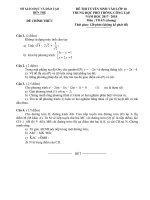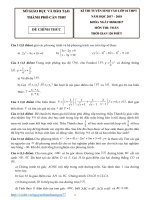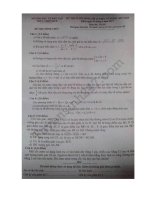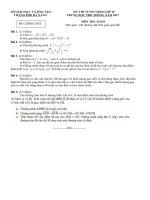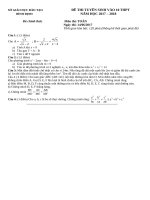Tải Đề thi thử vào lớp 10 môn tiếng Anh năm 2017 có đáp án (Đề 9 + 10) - Đề ôn thi vào lớp 10 môn tiếng Anh
Bạn đang xem bản rút gọn của tài liệu. Xem và tải ngay bản đầy đủ của tài liệu tại đây (96.51 KB, 3 trang )
<span class='text_page_counter'>(1)</span><div class='page_container' data-page=1>
ÔN LUYỆN TUYỂN SINH 10 – NĂM 2017
TEST 9
<b>Pick out the word whose underlined part is pronounced differently from</b>
<b>that of the other words.</b>
1. A. bulb B. trust C. dump D. pull
2. A. typhoon B. roof C. flood D. moon
3. Λ. collapsed B. hiked C. striped D. claimed
<b>Choose the best answer among A, B, C, or D that best completes each</b>
<b>sentence</b>.
4 . ...it was so cold, he went out without a coat.
A. If B. Although C. Since D. However
5. Ann suggested...at home at Christmas for a change.
A, stay B. to stay C. staying D. stayed
6. Mrs. Brown forgot her raincoat...she got wet.
A. so B. however C. because D. if
7. Peter is short. He's not to be a policeman.
A. so tall B. tall enough C. quite tall D. enough tall
8. Jupiter spins faster than...planet.
A. any B. any another C. any others D. any other
9. The core of the moon is much smaller, in relation to its size of the planets.
A. those B. than those C. ones D. than are those
10. ...the stove when you have finished cooking.
A. Put off B. Put out C. Put D. Put up with
11. Coal...very widely as a source of energy until the 19th<sub> century.</sub>
A. not used B. did not use C. not using D. was not used
12. She arranged...her friends in the afternoon as the weather was fne.
A. meeting B. to be meeting C. to have met D, to meet
13. 1 object...the proposal to restrict the use of cars in the city.
A. at B. with C. for D. to
<b>Choose the word or phrase among A, B, C, or D that best fìts each blank</b>
<b>space in the following passage.</b>
People who (14)...in the industrially advanced and affluent countries of the
world take telecommunication for granted. Computer data with text, graphics and
even video clips (15)...been added (16)...the telephone. Fax, e-mail and
modems have become integral parts of office equipment for most businesses in
the developed world. It is important to remember, however, that although North
America, Europe and Japan own about 85 percent of the world's telephones, they
have under a quarter of the world’s population.
Today, telecomnumications are at the centre οf (17)...international economy.
To participate in this econony, countries need telecommunications (18)...enable
them to obtain information and knowledge which they can use to attract
industrial (19)...and find new markets. Businesses and factories need the
telephone and computer because producers and customers may be thousands of
kilometres apart. Regional and national borders are no (20)...barriers to trade.
With the trend towards a more cooperation between countries,
(21)...telecommunications increase in importance. They are the key to
development and progress.
14. A. live B. sustain C. exist D. inhabit
15. A. have B. are C. is D. are
16. A. on B. for C. in D. to
17. A. an B. the C. some D. a
18. A. so B. thus C. to D. for
19. A. investor B. investment C. association D. investigation
20. A. further B. final C. more D. longer
21. A. local B. worldly C. national D. global
<b>Choose the underlined part among A, B, C, or D that needs correcting.</b>
22. Energy-saving bulbs should use to save electricity.
A. Energy-saving B. use C. to save D. electricity
23. He tried to go to work in spite of he was ill.
A. tried B. to work C. in spite of D. was
24. There were so much beautiful flowers that I couldn’t decide what to buy.
A. were B. so much C. decide D. to buy
<b>Use the correct form of the word given to complete each sentence</b>.
25. We have not received any...about the damage. (<b>explain</b>)
26. They disapproved of your bad... (<b>behave</b>)
27. T he...of population of that city made US surprised. (<b>grow</b>)
28. Your car is more...mine. It hardly seems to use any petrol at all.
(<b>economy</b>)
<b>Read the following passage carefully, then write True (T) or False (F) for</b>
<b>each statement.</b>
People all over the world eat rice. Millions of people in Asia, Africa, and South
America eat it every day of their lives. Some people eat almost nothing but rice.
Rice is a kind of grass. There are more than 7,000 kinds of rice. Most kinds are
water plants. Farmers grow rice in many countries even in the southern of Russia
and in eastern Australia. No one really knows where rice came from. Some
scientists think that it started to grow in two places. They think that one kind of
rice grew in southern Asia thousands of years ago. Another kind probably grew
in West Africa. Other scientists think rice came from India, and Indian travelers
took it to other parts of the world.
29. ...Rice is a kind of grass.
</div>
<span class='text_page_counter'>(2)</span><div class='page_container' data-page=2>
32. ...Some scientists think that rice first grew in two places.
<b>Rewrite the following sentences without changing their meanings.</b>
33. We couldn't see the paper anywhere.
The paper...
34. Remember to check vour luggage.
Don't...
35. No one could know her reaction to the problem.
Her reaction...
36. People say that the boy has been saved.
The boy...
TEST 10
<b>Pick out the word whose primary stress is different from that of the others.</b>
1. A. tragedy B. tolerant C. productive D. socialize
2. A. receive B. install C. persuade D. cover
3. A. plumber B. border C. nuclear D. typhoon
<b>Choose the best answer among A, B, C, or D that best completes each</b>
<b>sentence</b>.
4. It's a pity you didn't go on a trip with us. We all wish you...with us.
A. go B. could go C. went D. had gone
5. If I find your book, I you at once.
A. phoned B. will phone C. would phone D. to phone
6. Wear a helmet when riding a motorbike. Helmets are used...our heads.
A. protect B. to protect C. protecting D. protected
7. My teacher would rather I...the problem by myself.
A. solve B. solved C. solving D. to solve
8. She doesn't call me as often as she...
A, was to B. get used to C. not used to D. used to
9. ...the moon has no water, its surface responds to the gravitational force of the
earth.
A. Therefore B. Except C. However D. Although
10. We first met each other...we were at university.
A. while B. for C. until D. since
11. He would be happy to see you, ...he?
A. will B. would C. wouldn’t D. won’t
12. They arc encouraged to participate...sporting activities.
A. at B. in C. with D. for
13. Ann is very bad-tempered. How do you...her?
A. put up with B. put with C. put up to D. putting up with
<b>Choose the wont or phrase among A, B, C, or D that best fits each blank</b>
<b>space in the following passage.</b>
Electronic games usually consist of software sold in the form of discs and
(14)...additional equipment to be played. Video and computer games are some
popular electronic games. People play video games on hardware systems
(15)...for game playing and usually use television sets as a viewing screen.
People play computer games on a personal computer and v iew them on the
computer's monitor.
Internet games emerged with the popuiaritv of the Internet. By (16)...online,
a plaver can participate in (17)...kinds of game activities. In one popular
category, (18)...as massively multiplaccr role-playing games, thousands of
people can · take part in a game at one time. Each person (19)...a different
character in a detailed, imaginary' world. The Internet also provides new ways to
play board games, card games and electronic games. Many websites allow
players (20)...partners and opponents and to compete in chess, bridge, and
many other traditional games. (21)...video and computer games now include an
option to play them online, making it possible to play against opponents who live
in other parts of the world.
14. A. requiring B. require C. requires D. required
15. A. are designed B. designed C. designing D. to design
16. A. have gone B. go C. going D. to go
17. A. little B. many C. much D. few
18. A. knowing B. called C. known D. calling
19. A. to control B. control C. controls D. controlling
20. A. to find B. find C. found D. finding
21. A. Most the B. Most C. Almost D. Most of
<b>Choose the underlined part among A, B, C, or D that needs correcting.</b>
22. I asked him whose car he borrowed the night before.
A. him B. whose C. borrowed D. the
23. The next important question we have to decide is when do we have to finish
our work.
A. important B. have to C. is D. do we have to
24. Mrs. Brown, his children couldn't swim, said that there should be more
notices warning people.
A. his children B. swim C. there should be D. warning people
<b>Use the correct form of the word given to complete each sentence.</b>
</div>
<span class='text_page_counter'>(3)</span><div class='page_container' data-page=3>
<b>Read the following passage carefully, then write True (T) or False (F) for</b>
<b>each statement.</b>
How do television and other visual media affect the lives of individuals and
families all over the world? The media can be very helpful to people who
carefully choose the movies and shows that they watch. With high quality
programs in various fields of study, such as science, medicine, history, arts and
so on, television and video tapes increase the viewers' knowledge, they can also
improve thinking ability. Moreover, television benefits elderly people who
cannot go out often, as well as patients in hospital. Additionally, it offers
language learners the advantage of "real-life" audiovisual instruction and aural
comprehension practice at any time of day and niaht. Television and video can
also provide almost everyone with good entertainment - a pleasant way to relax
and spend free time at home.
Nevertheless, there are several serious disadvantages to the visual media. First
of all, some people watch the "tube" for more hours a day than they do anythine
else. Instead of spending time taking care of their children, many parents use
television as an "electronic baby-sitter". As a result, television and video can
easily replace family communication, physical activities and other interests.
Secondly, those who, young and old, spend more time watching television than
manual work can easily suffer from short-sightedness and obesity. The third
negative feature of the media is the amount of violence and horror on the screen
that has bad effects on children and teenagers. Finally, the most netiative effect
of television and video might be addiction. People often feel a strange and
powerful need to watch or play a video tape even when they do not enjoy it or
have free time for entertainment.
29. ...Television and video tapes increase the viewers' knowledge because of
high quality programs in various fields of study.
30. ...Television and other visual media had bad effects on elderly people and
patients in hospital.
31. ...People have a trend of addicting to television.
32. ...Television causes a large amount of violence in society.
<b>Rewrite the following sentences without changing their meanings.</b>
33. It took us onlv ten minutes to finish the homework.
We spent...
34. I find it not interesting to do this work
I am fed...
35. It is ages since we last met him.
We haven't...
36. In spite of working until midnight, I didn't feel tired.
Although...
<b>ANSWER KEYS</b>
<b>TEST 9</b>
1. D 2. C 3. D 4. B 5. C 6. A 7. B 8. D 9. B 10. B 11. D 12. D
13. D 14. A 15. A 16. D 17. B 18. C 19. B 20. D 21. D
22. B (use be used)
23. C (in spite of although )
24. B (so much so many)
25. explanation 26. behaviour 27. growth 28. economical
29. <i>True</i> 30. <i>True</i> 31. <i>False</i> 32. <i>True</i>
33. The paper couldn't be seen anywhere.
or: The paper could be seen nowhere.
34. Don't forget to check your luggage.
35. Her reaction to the problem couldn't be known.
36. The boy is said to have been saved.
<b>TEST 10</b>
1. C 2. D 3. D 4. D 5. B 6. B 7. B 8. D 9. D 10. A 11. C 12. B
13. A 14. B 15. B 16. C 17. B 18. C 19. C 20. A 21. B
22. C (borrowed had borrowed)
23. D (do we have to we have to)
24. A (who children whose children)
2 5 .independence 26. e.xplanation 27. convenient 28. appointment
29. <i>True</i> 30. <i>False</i> 31. <i>True</i> 32. <i>False</i>
33. We spent only ten minutes finishing the homework.
34. I am fed up with doing this work.
35. We haven't met him for ages / for a long time.
</div>
<!--links-->

